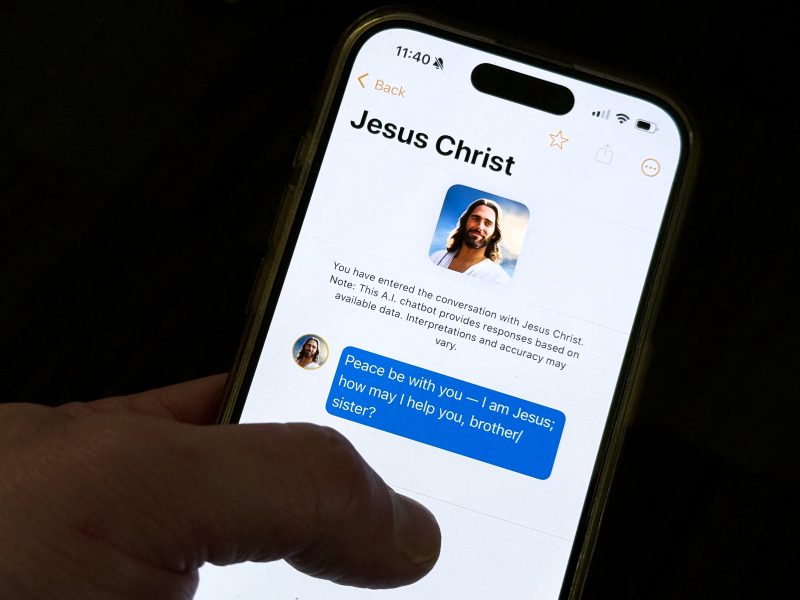(NewsNation) — Humanity has long yearned to understand the fundamental question of why we exist on Earth, and many have historically turned to religion for answers.
Artificial intelligence is rapidly expanding, and tech companies are looking for ways to further embed the technology into people’s everyday lives.
One well-documented example is in the realm of faith, and recent reports suggest that more and more people are turning to AI chatbots to pursue religious discovery and expression and to get answers to some of life’s biggest questions.
‘Faith tech’ industry taking off
The “faith tech” industry has exploded recently, with several apps featuring religious Chatbots dominating the Apple App Store, as reported by The New York Times.
The Bible chat app calls itself “the #1 faith app in the world” and features “the first AI in the world trained exclusively on the Bible.”
Another app, Hallow, was the most downloaded app for a period in 2024 and features AI that answers questions based on Catholic teachings.
Chatwithgod.ai is a website that allows users to talk “directly” to God from the faith of their choosing and provides answers to a variety of questions that don’t necessarily have to be faith-based.
Religious AI chatbots on the rise
Some chatbots have also been developed to mimic a variety of religious figures. Various iterations of ‘AI Jesus’ chatbots have caused a stir in spiritual circles, with some questioning the accuracy and integrity of such technology.
And it’s not just Christianity; the BBC recently reported on a 25-year-old student in India, Vijay Meel, who uses GitaGPT, an AI chatbot trained on the Bhagavad Gita, the Hindu holy book.
Meel told the BBC that the technology has helped him cope with feelings of dejection stemming from his academic struggles.
“People feel disconnected from community, from elders, from temples. For many, talking to an AI about God is a way of reaching for belonging, not just spirituality,” Holly Walters, an anthropologist and lecturer at Wellesley College, told the BBC.
Religious experts respond
Some faith leaders argue that the technology can serve as a segue into faith.
“There is a whole generation of people who have never been to a church or synagogue,” Rabbi Jonathan Romain, a leader within Britain’s Reform Jewish movement, told The New York Times. “Spiritual apps are their way into faith.”
However, others disagree, pointing out that AI’s shortcomings could be problematic in a religious setting.
Chatbots “tell us what we want to hear,” Texas A&M technology and religion professor Heidi Campbell told The New York Times.
“It’s not using spiritual discernment; it is using data and patterns,” Campbell continued.
Catholic church weighs in on AI
Pope Leo XIV and the Catholic church have had a lot to say about AI since Leo was elected as the first American pontiff earlier this year.
In his first address to the college of cardinals, Leo called the developments in AI a new industrial revolution that poses “new challenges for the defense of human dignity, justice and labor.”
In January 2025, the Vatican released a document signed by Pope Francis addressing the ethical dilemmas raised by AI:
“Like any product of human creativity, AI can be directed toward positive or negative ends. When used in ways that respect human dignity and promote the well-being of individuals and communities, it can contribute positively to the human vocation. Yet, as in all areas where humans are called to make decisions, the shadow of evil also looms here. Where human freedom allows for the possibility of choosing what is wrong, the moral evaluation of this technology will need to take into account how it is directed and used,” the Vatican document reads.
NewsNation’s Susie Pinto contributed to this report.
The post People are using AI to communicate with God — but why? appeared first on WHNT.




